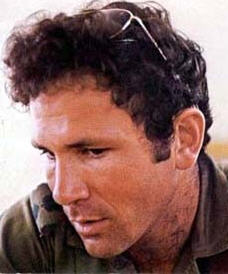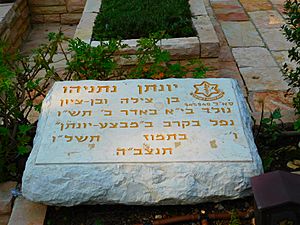Yonatan Netanyahu facts for kids
Quick facts for kids
Yonatan Netanyahu
|
|
|---|---|

Last known photo of Netanyahu, taken shortly before his death leading Operation Entebbe
|
|
| Other name(s) | Jonathan Netanyahu |
| Nickname(s) | Yoni |
| Born | March 13, 1946 New York City, New York, U.S. |
| Died | July 4, 1976 (aged 30) Entebbe, Uganda |
| Allegiance | |
| Service/ |
|
| Years of service | 1964–1976 |
| Rank | |
| Unit | Paratroopers Brigade General Staff Reconnaissance Unit 269 |
| Commands held | General Staff Reconnaissance Unit 269 |
| Battles/wars | |
| Awards | Medal of Distinguished Service |
| Spouse(s) |
Tirza Netanyahu
(m. 1967; div. 1972) |
| Relations |
|
Yonatan "Yoni" Netanyahu (Hebrew: יונתן נתניהו; March 13, 1946 – July 4, 1976) was a brave Israeli soldier. He was born in the United States but served in the Israel Defense Forces (IDF). He led an important special forces unit called Sayeret Matkal.
Yoni became famous for leading Operation Entebbe in 1976. This was a daring mission to rescue people held hostage at Entebbe Airport in Uganda. Most of the hostages were saved, but Yoni was the only Israeli soldier who died during the operation. Because of his bravery, the mission was later renamed "Operation Yonatan" in his honor.
Yoni was the oldest son of a history professor, Benzion Netanyahu. His younger brother, Benjamin Netanyahu, later became the Prime Minister of Israel. Both Benjamin and their youngest brother, Iddo Netanyahu, also served in the same special forces unit as Yoni.
Contents
Early Life and Education
Yonatan Netanyahu was born in New York City in 1946. His mother was from Israel, and his father was from Poland. Yoni was named after his grandfather, Rabbi Nathan Mileikowsky, and a family friend, Colonel John Henry Patterson. He had two younger brothers, Benjamin and Iddo.
Yoni's family moved back to Israel in 1949 when he was two years old. They lived in Jerusalem. In 1956, they moved to the United States again, but returned to Israel in 1958. Yoni went to high school in Jerusalem. In 1963, his family moved back to the U.S. for a short time, and he went to Cheltenham High School in Pennsylvania. He was even classmates with famous baseball player Reggie Jackson.
While in high school, Yoni thought a lot about his life's purpose. He wrote in a letter, "I ought to be ready at every moment of my life to confront myself and say—'This is what I've done'." After finishing high school in 1964, he returned to Israel to join the army.
Joining the Army
Yoni joined the Israel Defense Forces in 1964. He chose to serve in the Paratroopers Brigade, which is a special unit that jumps from planes. He was very good at his training and became a commander of a paratrooper company.
In 1967, Yoni thought about going to college, but the threat of war made him stay in Israel. He wrote, "This is my country and my homeland. It is here that I belong."
Military Service and Wars
Yoni fought in the Six-Day War in June 1967. During a battle in the Golan Heights, he was hurt while helping to rescue another soldier behind enemy lines. He received an award for his bravery after this war.
After being wounded, he went to Harvard University in the U.S. to study. He was very good at philosophy and math. But after a year, he felt he needed to go back to Israel and rejoin the army. He wrote, "At this time, I should be defending my country. Harvard is a luxury I cannot afford." He returned to Harvard briefly in 1973 but again chose to serve in the military.
Special Operations
By 1970, Yoni was leading a special anti-terrorist unit called Sayeret Matkal. In 1972, he became the unit's deputy commander. That year, he led a mission into Syria called Operation Crate 3. In this mission, Syrian officers were captured and later exchanged for Israeli pilots who were prisoners.
The next year, he took part in Operation Spring of Youth. This operation targeted leaders of a terrorist group called Black September.
During the Yom Kippur War in October 1973, Yoni led his Sayeret Matkal unit in the Golan Heights. They fought bravely and stopped Syrian commandos from attacking the area. In the same war, he also rescued a wounded officer, Yossi Ben Hanan, from behind Syrian lines.
After the war, Yoni received the Medal of Distinguished Service. This is Israel's third-highest military award, given for his heroic rescue of Ben Hanan. Yoni then chose to become an armor (tank) commander because many tank officers had been lost in the war. He became a skilled tank commander and led his brigade to become a top military unit in the Golan Heights.
Operation Entebbe
Yonatan Netanyahu was killed on July 4, 1976, while leading the rescue mission during Operation Entebbe. He was the only Israeli soldier who died during this very successful raid. Three hostages also died, along with the hijackers and many Ugandan soldiers.
Yoni was shot outside the building that his team was storming. He died in the arms of the mission's medical commander. The operation was a great success, saving many lives. In his honor, the mission was renamed Mivtsa Yonatan ("Operation Jonathan").
Yoni was buried in Jerusalem's Military Cemetery at Mount Herzl on July 6. Many people, including top government officials, attended his military funeral. Shimon Peres, who was the Defense Minister at the time, said that Yoni was "one of Israel's finest sons, one of its most courageous warriors, one of its most promising commanders."
There are memorial trees planted in his honor at his high school, Cheltenham High School, and a plaque in the school's lobby.
Personal Writings and Films
In 1980, many of Yoni's personal letters were published. The author Herman Wouk called them a "remarkable work of literature." These letters, often written quickly during difficult times, show that Yoni was a talented and thoughtful person. They reveal his dedication to serving his country and protecting it, even though he could have done many other things.
A play called To Pay the Price was created based on Yoni's letters. A documentary film called Follow Me was also released in 2012. It tells the story of Yoni's life and his final mission at Entebbe. The film uses parts of his letters and other words he spoke.
Legacy
Even before he died at age 30, Yoni Netanyahu was seen as a hero in Israel.
His brother, Benjamin Netanyahu, who later became Prime Minister, said that Yoni's death made him take a strong stand against all forms of terrorism.
The Jonathan Institute
In 1979, the Jonathan Institute was started by Benjamin Netanyahu. This institute holds international meetings about terrorism. Yoni's father said in 1977 that Yoni would have been disappointed by how some countries reacted to terrorism. He believed that certain important principles must be defended for civilization to survive.
The Jonathan Institute's conferences, held in Jerusalem and Washington, D.C., brought together government officials and received a lot of attention.
See also
 In Spanish: Yonatan Netanyahu para niños
In Spanish: Yonatan Netanyahu para niños
 | Misty Copeland |
 | Raven Wilkinson |
 | Debra Austin |
 | Aesha Ash |


